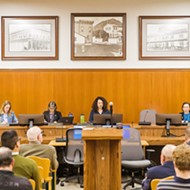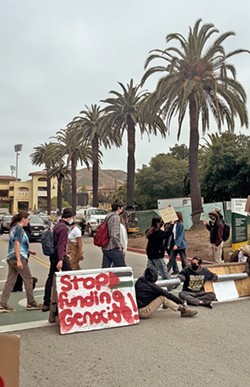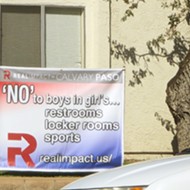[
{
"name": "Newsletter Promo",
"id": "NewsletterPromo",
"class": "inlineCenter",
"insertPoint": "4",
"component": "15264767",
"requiredCountToDisplay": "0"
},
{
"name": "Ad - Medium Rectangle CC01 - 300x250 - Inline Content",
"class": "inlineCenter",
"insertPoint": "8",
"component": "15582119",
"requiredCountToDisplay": "12"
},{
"name": "Ad - Medium Rectangle LC01 - 300x250 - Inline Content",
"class": "inlineCenter",
"insertPoint": "18",
"component": "15582122",
"requiredCountToDisplay": "22"
},{
"name": "Ad - Medium Rectangle 9 - 300x250 - Inline Content",
"class": "inlineCenter",
"insertPoint": "28",
"component": "15582121",
"requiredCountToDisplay": "32"
}]
Cal Poly students and faculty claim that a directive ordered by the California State University (CSU) Office of the Chancellor infringes on their First Amendment rights.
Adopted on Aug. 15, the new Time, Place, and Manner directive states that it's designed to facilitate academic freedom, freedom of expression, and recognizes the rights, privileges and responsibilities of university campus communities.
"Freedom of expression is a cornerstone of a democratic society and is essential to the educational process," the directive states. "Institutions of higher education have a special obligation to encourage and support the free expression of ideas, values, and opinions, even where they may be unpopular or controversial."
Now, if anyone who attends or works for one of the state school system's 23 universities wants to "lawfully exercise their right to freedom of expression on university property," they have some new guidelines to follow.
For instance, wearing masks or face coverings while on CSU property with the intent to intimidate and harass or for the purpose of not being recognized is not allowed.
"For all persons who in the judgment of a university official are in violation of a university policy or the law, the university reserves the right to require such persons, including students, employees, and nonaffiliates, to show identification when requested to do so by a university official," the directive reads. "Failure to provide identification in this circumstance is itself a violation of this policy and may also be a criminal violation."
Cal Poly student Juls Altman has spent a good portion of her college career protesting for what she believes in. She's co-chair of the university's chapter of the Young Democratic Socialists of America and told New Times that this is clearly an attack on the recent pro-Palestine protests that have happened on campuses. She added that it's unfair to tell people they can't wear masks with the COVID-19 pandemic ongoing.
"A lot of activists are COVID conscious, and protests are generally crowded environments, and it's also just generally unsafe. ... It's written in a way that can be used against us regardless of how they're going to enforce it," she said. "We have a right to mask at protests, we have a right to mask in general."
Those looking to make their voices heard on CSU campuses are now required to do so without interrupting university functions, operations, or events, and can't interfere with the rights of others.
According to the directive: Protests, marches, and demonstrations cannot disrupt class instruction or other scheduled academic, educational, or cultural activities; obstruct pedestrian or vehicular traffic; take up space in parking lots, parking structures, driveways, crosswalks, exits, fire lanes, streets, roadways, and doorways; use speakers; harass, intimidate, or block the free movement of others; or create and cause unsafe conditions around entrances, exits, stairways, elevator lobbies, and escalators.
Altman said the new guidelines violate the First Amendment and negatively impact students' and faculty's ability to fight for what they believe in.
"If a protest is not disruptive, then no one has any reason to ever listen to us," she said. "If it doesn't ever disrupt university operations, then they quite literally don't ever need to listen to us because it's not impacting them in any way."
The new Time, Place, and Manner directive also states that while individuals can protest speakers who they disagree with, they aren't allowed to prevent that speaker from expressing their views or prevent members in the audience from hearing or seeing the speaker. It also bans encampments and overnight loitering, temporary or permanent structures, and climbing or scaling anything on university property.
Cameron Jones, the political action and legislative rep for Cal Poly's chapter of the California Faculty Association (CFA), told New Times that the directive is concerning, and requiring signs to be approved by university administration is a way for the CSU system to prevent future employee strikes.
The directive states that posters, signs, banners, and chalking need to have written permission from the appropriate university official prior to using it.
"This is new in this new directive, and what does that mean? I can't have a sign that says 'We want 5 percent' if it's not approved by the administration," he said. "The problem is that it's so vague on how it's being implemented."
Jones said the Office of the Chancellor hasn't reached back out to faculty or the CFA yet with clearer guidelines on how this new directive will be enacted.
Cal Poly faculty, some of whom identify as faculty of color, have gone to Jones with fears that they're going to be silenced.
"It's obviously an attempt to stifle free speech on campus, and they're asking questions like, 'Will this mean I can't say what I want in classes? Does this mean I have to censor my research, or my research will be censored?'" he said. "They're very scared. ... Cal Poly is trying to increase diversity, and here we have diverse faculty who are worried that they're going to be silenced."
Jones said the CSU system's upper management didn't consult with the CFA or the academic senate, which represents the faculty as well, a requirement of the Higher Education Employer-Employee Relations Act (HEERA). Therefore, he said, the CFA's position is that the directive doesn't apply to faculty.
"We're supposed to be consulted before these types of changes, and they haven't done that yet, so the law is pretty clear on our side," he said.
In the past, Jones said, there was a negotiation period between the various university unions and the Chancellor's Office, but this time there was nothing. The CFA feels like it's in "uncharted territory" when it comes to implementing the directive because of the lack of communication.
The directive states that it's not intended to interfere with the rights provided by HEERA and doesn't prohibit CSU unions such as the CFA from communicating with their members regarding union-related activities or engaging in protected or concerted activities.
Repeated violation of the new policy could result in criminal arrest, code of conduct disciplinary measures for students, discipline for employees, and subsequent legal action by the university, according to the CSU Chancellor's Office. Δ
Reach Staff Writer Samantha Herrera at [email protected].
Latest in News
Readers also liked…
-

When the levee breaks: Oceano residents, county officials walk a tightrope of regulations to manage Arroyo Grande Creek, which some say led to the levee's failure in January
May 18, 2023 -

Cal Poly report highlights offshore wind's potential to spur green energy transition
Jun 8, 2023 -

Cal Poly students demand rent control, accountability for substandard housing from SLO City Council
Jun 22, 2023





